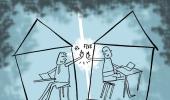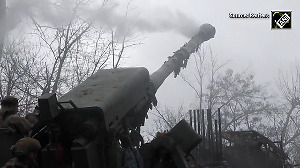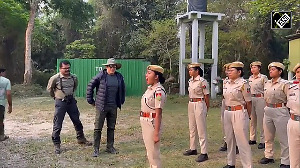The centrality of idle office chitchat has only recently come to be acknowledged by executives as they jettison their access cards and work from home in larger numbers, notes Kanika Datta.

Management by Walking Around or MBWA came into vogue in the late 1980s as Tom Peters and Robert Waterman distilled the learnings from their bestselling book In Search of Excellence.
MBWA posits that managers pick up meaningful ideas and keep tabs on morale by informally engaging with colleagues in unscripted settings -- what we understand as watercooler moments in more modern parlance.
Today, that time-honoured practice has become one of the biggest casualties of the pandemic.
Those in the WFH zone have made admirable efforts to replicate watercooler moments through WhatsApp and Zoom groups and so on, but everyone knows it's not quite the same.
Watercooler moments, a catch-all phrase that covers the cigarette- or caffeine break or general 'time-pass', to use Mumbaikars's evocative phrase, present the unique possibilities of impromptu meetings with colleagues across departments for gossip, chats, jokes, shop talk, romance (illicit or otherwise) and, just occasionally, the breakthrough idea.
Stimulating, frustrating, entertaining or scurrilous, watercooler talk has been a staple of corporate culture for yonks, long before Messrs Peters and Waterman formalised it as a concept.
Despite its Gestapo-like implication, the MBWA phraseology reflects the transition in American management thinking from the hard-edged metrics of the Whiz Kid generation to the kinder, gentler realms of what came to be known as "human resources", now trendily abbreviated to HR.
The best-managed companies, at least those that figured in In Search of Excellence, we were told, were those with managements practised MBWA (it is another matter that most of the companies in the book turned out to be poor performers 20 years later).
Among enthusiastic MBWA practitioners was Sam Walton of Walmart -- one of the few In Search of Excellence companies to remain a star 20 years later.
Walton apparently believed in leaving his office and chatting with frontline staff in his stores.
Walton clearly did not pass on this wisdom to his successors, since Walmart scarcely qualifies as an exemplar of HR practices today.
What Peters and others did not recognise is that the quality of watercooler talk is as important a marker of corporate culture as a company's formal HR policies, so much so that Scott Adams, creator of the Dilbert cartoon, made watercooler talk a potent element of his perceptive little digs at corporate life.
My favourite cartoons, however, are by two unnamed cartoonists.
One shows one executive telling another at the watercooler: "Man, work sucks, huh?" The ironic comment below: "The kind of synergy that can only happen at the office."
The other is a watercooler setting in a multicultural company, and has one executive telling another, "Look, I really do want to talk to you about last night's Lost ...it feels a little clichéd to do it right here."
But ever since "HR" took centre-stage in management practice, watercooler moments became something of a fetish with senior managers.
Too many of them make such an obvious attempt at such engagements with their subordinates as to defeat the purpose of the exercise.
Many trendy companies seek to extend and institutionalise it by setting up trendy recreation rooms or organising regular office parties, a wearying exercise where someone or the other can be depended to get drunk or be indiscreet.
But really, watercooler dynamics work best when they are unstructured.
The age of the Internet has supplemented the watercooler with WhatsApp groups or variations thereof.
Unfiltered by the organisational environment, these engagements can be vastly more fun but also more intense or scandalous.
It is possible to come to virtual blows on WhatsApp in a way that is not possible in physical office space.
But all in all, these groups are a poor substitute for the real thing.
Essentially closed user groups, they preclude the possibility of inter-departmental encounters (though they also narrow the sycophant's opportunity to suck up to the boss).
The centrality of idle office chitchat has only recently come to be acknowledged by executives as they jettison their access cards and work from home in larger numbers.
Inevitably, it took some enterprising souls to create an app that claims to offer the joys of watercooler conversations.
Thomas Malone, the creator and founding director of the MIT Center for Collective Intelligence, and two colleagues created Minglr, which is based on an open source video-conferencing system that claims to enable the kind of spontaneous conversations people have in the office.
According to a survey, 86 per cent of those who used Minglr said future online conferences should use something like this.
From what I can gather, it's the equivalent of enabling messaging on the side during meetings.
In this imperfect COVID-19 ridden world it may be the closest you'll get to watercooler talk.
But like Classic Coke, only the real thing really works.












 © 2025
© 2025